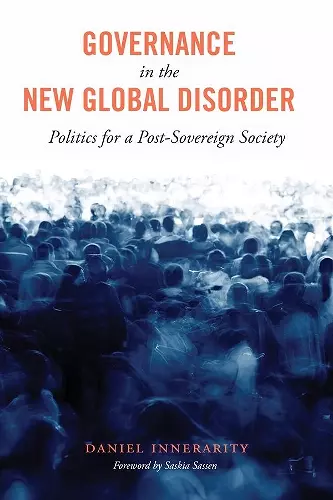Governance in the New Global Disorder
Politics for a Post-Sovereign Society
Daniel Innerarity author Sandra Kingery translator
Format:Hardback
Publisher:Columbia University Press
Published:27th Sep '16
Currently unavailable, and unfortunately no date known when it will be back

This insightful work examines the challenges posed by globalization, particularly the need for global governance in Governance in the New Global Disorder.
In Governance in the New Global Disorder, political philosopher Daniel Innerarity delves into the complexities brought about by globalization. While many discussions around globalization emphasize its social and economic advantages, Innerarity shifts the focus to its often overlooked consequences. The integration of diverse societies into a global framework has led to a state of persistent uncertainty, challenging the very foundations of governance. The influence of multinational corporations has eroded traditional notions of sovereignty, leaving individuals questioning who holds power and accountability in this new landscape.
The book highlights how the rapid changes associated with globalization have contributed to economic instability, with markets capable of collapsing without warning, leaving communities in prolonged recovery. Innerarity raises critical questions about how to navigate the competing interests of states, markets, and societies amidst this turmoil. He argues that the solution lies in embracing global governance and redefining justice beyond national borders. This approach aims to address the shared vulnerabilities that arise from interconnected economies and political dependencies.
Furthermore, Governance in the New Global Disorder calls for a rethinking of global politics to tackle universal risks related to security, health, and environmental sustainability. With contributions from sociologist Saskia Sassen in the foreword, the book distills Innerarity's insights and proposes actionable solutions to mitigate the escalating tensions in our increasingly interconnected world.
Governance in the New Global Disorder is a deep reflection about the world in which we live and the dialectics between all and nobody. It belongs to the category of important books that dominate the debates on globalization?, and with this piece, Daniel Innerarity is obviously one of the key intellectuals that intervenes. -- Michel Wieviorka, author of Evil This book will become a classic in the literature engaging with the analysis and consequences of globalization. -- Montserrat Guibernau, author of Belonging: Solidarity and Division in Modern Societies
ISBN: 9780231170604
Dimensions: unknown
Weight: unknown
232 pages